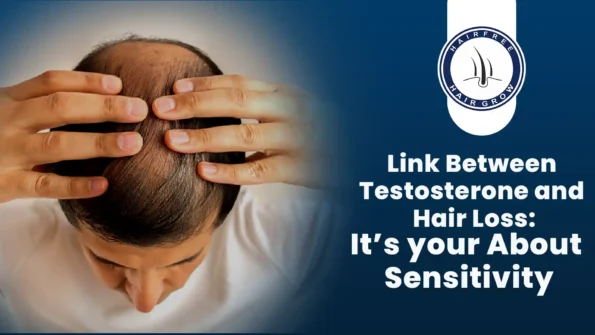Let’s be honest, finding more hair in the shower drain than usual isn’t exactly a pleasant experience. Especially if you’re a man in your late 40s or early 50s. It’s easy to blame age, but there could be another culprit: testosterone. This key hormone, vital for many manly functions, can also play a surprising role in hair loss.
This blog will clear up the confusion. We’ll explore the connection between testosterone and hair loss, separate fact from fiction, and even talk about ways to address it. So, ditch the worry and grab a comb, because we’re about to get to the root of the problem.
Link Between Testosterone and Hair Loss
Losing hair? It doesn’t necessarily mean you have sky-high testosterone levels, even though that’s a common belief.
Many men (and some women) experience hair loss, and it’s all thanks to tiny things in your scalp called hair follicles. These follicles are like little factories that grow hair. But over time, hormones and genes can team up to shrink these follicles, making the hair they produce thinner and thinner until they stop growing altogether.
Testosterone plays a role, but not in the way you might think. Testosterone itself doesn’t directly cause hair loss. Instead, it gets converted into another hormone called DHT, which can mess with hair follicles in people who are genetically prone to it. So, it’s all about how sensitive your hair follicles are to DHT, not how much testosterone you have floating around.
Types Of Testosterone
There are two main types of testosterone in your body:
Free Testosterone
This type floats around in your bloodstream without being attached to any proteins. It’s like the “active” form of testosterone, interacting directly with cells to do its job.
DHT (Dihydrotestosterone)
DHT is a derivative of testosterone. It’s produced when testosterone interacts with an enzyme called 5-alpha reductase, along with another hormone called DHEA (which is more common in women). DHT is mainly found in the skin, hair follicles, and prostate gland. It’s known for its role in causing hair loss, especially in men. DHT attaches to hair follicles, making them smaller over time, which leads to hair thinning and loss.
Both testosterone and DHT play important roles in developing secondary sexual characteristics in men, like a deeper voice, increased body hair, sperm production, and the growth of the testicles.
Genetics Dictate Sensitivity
So, why doesn’t everyone with high testosterone levels experience hair loss? It all boils down to genetics. People inherit genes that determine how sensitive their hair follicles are to DHT. If you have genes for high DHT sensitivity, even normal testosterone levels can trigger hair loss. Conversely, someone with low sensitivity might not lose hair despite having high testosterone.
Other Factors Influencing Hair Loss
While DHT is a major player, other factors can contribute to hair loss:
- Age: Hair growth naturally slows down with age, making you more prone to thinning.
- Stress: Chronic stress can disrupt hair growth cycles and lead to temporary hair loss.
- Medical Conditions: Certain medical conditions and medications can cause hair loss as a side effect.
Hair Loss and Testosterone Levels
Your body naturally produces a hormone called testosterone, which plays a big role in things like muscle mass, bone density, and hair growth. But sometimes, there can be too much or too little of this hormone in your body.
When there’s too much testosterone, it can lead to the production of another hormone called DHT (Dihydrotestosterone). DHT can mess with your hair follicles—the tiny pores in your skin where hair grows from. It binds to certain proteins in your body and makes your hair follicles smaller. This can make your hair thinner and even stop new hair from growing.
Now, here’s the twist: even if you have low testosterone levels, you might still have enough DHT to cause hair loss. It’s been found that folks with male pattern baldness often have low testosterone but normal DHT levels. It’s like their hair follicles are more sensitive to DHT, so even a normal amount can cause problems.
So, whether your testosterone levels are high or low, it can still mess with your hair. And if you have a family history of baldness, genetics might make your hair follicles even more sensitive to these hormone changes.
Basically, if you’re losing hair, it might not just be about your testosterone levels—it’s also about how your hair follicles react to hormones, and that’s mostly down to your genes.
Treatment Option For Hair Loss Caused By Fluctuating Testosterone Levels
If you’re dealing with hair loss because of fluctuating testosterone levels, there are several treatments available. These treatments mainly work by either blocking the hormone responsible for hair loss (DHT) or by inhibiting its production. Here are some common options:
Finasteride
This is a pill that’s been shown to be really effective for men dealing with baldness. It stops DHT from binding to the enzyme that causes hair loss. Studies have found that about 87% of men experienced success in regrowing hair with finasteride.
Minoxidil
Originally a medication for high blood pressure, minoxidil was found to have a side effect of increasing hair growth. When applied topically, it widens blood vessels, improving blood flow to hair follicles and promoting hair growth.
Biotin
Biotin, which is a type of Vitamin B, is great for turning nutrients into energy that your cells need to function. It also boosts the production of keratin, the protein that makes up your hair. Research shows that biotin can help with hair growth and prevent hair loss.
Pumpkin Seed Oil
Studies suggest that pumpkin seed oil can help with hair loss in men with male pattern baldness. It works by blocking DHT, which stops hair loss and thinning.
B Vitamins
These are super important for keeping your hair and scalp healthy. Not getting enough B vitamins can lead to hair thinning and eventually hair loss. They also help improve blood flow to your hair follicles, which is crucial for healthy hair.
These treatments can be effective, but it’s always a good idea to talk to a doctor before starting any new medication or supplement regimen.
Potential Side Effects of DHT Blockers and Inhibitors
- Erectile dysfunction
- Premature ejaculation
- Gynecomastia (excess fat around the breast area)
- Facial hair darkening
- Skin rashes
- Nausea
- Vomiting
- Delayed ejaculation
- Cardiac issues
Get in touch with the best of our hair doctors to cure your hair loss. HairFree HairGrow is one of the best hair transplant clinics in India, currently branches at Hyderabad, Surat, Pune, Gurugram, Ahmedabad, Kolkata, Bhopal and Mumbai.
Visit your nearest branch or Call us at: +91-7272832222

Written By
Dr. Pankaj Khunt
MD – Ukraine
Dr. Pankaj Khunt is a leading hair restoration expert specializing in testosterone and hair loss. With advanced knowledge in hormonal hair loss, he offers personalized treatments to help patients restore hair health and manage hair thinning effectively through evidence-based solutions.
Disclaimer
We’ve made all possible efforts to ensure that the information provided here is accurate, up-to-date and complete, however, it should not be treated as a substitute for professional medical advice, diagnosis or treatment. See Detailed Disclaimers Here.

